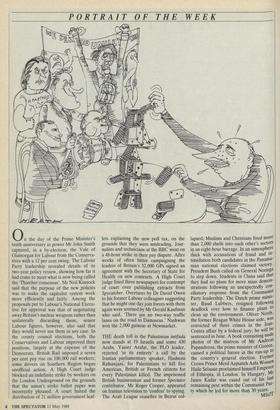PORTRAIT OF THE WEEK
0 n the day of the Prime Minister's tenth anniversary in power Mr John Smith captured, in a by-election, the Vale of Glamorgan for Labour from the Conserva- tives with a 12 per cent swing. The Labour Party leadership revealed details of its two-year policy review, showing how far it had come to meet what is now being called the 'Thatcher consensus'. Mr Neil Kinnock said that the purpose of the new policies was to make the capitalist system work more efficiently and fairly. Among the proposals put to Labour's National Execu- tive for approval was that of negotiating away Britain's nuclear weapons rather than unilaterally discarding them; senior Labour figures, however, also said that they would never use them in any case. In the county council elections, both the Conservatives and Labour improved their positions, largely at the expense of the Democrats. British Rail imposed a seven per cent pay rise on 100,000 rail workers; some drivers on Southern Region began unofficial action. A High Court judge blocked an indefinite strike by workers on the London Underground on the grounds that the union's strike ballot paper was incorrectly phrased. A court halted the distribution of 21 million government leaf- lets explaining the new poll tax, on the grounds that they were misleading. Jour- nalists and technicians at the BBC went on a 48-hour strike in their pay dispute. After weeks of often bitter campaigning the leaders of Britain's 32,000 GPs signed an agreement with the Secretary of State for Health on new contracts. A High Court judge fined three newspapers for contempt of court over publishing extracts from Spycatcher. Overtures by Dr David Owen to his former Labour colleagues suggesting that he might one day join forces with them again were scorned by Mr Gerald Kaufman who said, 'There are no two-way traffic lanes on the road to Damascus.' Nashwan won the 2,000 guineas at Newmarket.
THE death toll in the Palestinian intifada now stands at 19 Israelis and some 430 Arabs. Yasser Arafat, the PLO leader, rejected 'in its entirety' a call by the Iranian parliamentary speaker, Hashemi Rafsanjani, for Palestinians to kill five American, British or French citizens for every Palestinian killed. The imprisoned British businessman and former Spectator contributor, Mr Roger Cooper, appeared on Iranian television to 'confess' to spying. The Arab League ceasefire in Beirut col- lapsed; Muslims and Christians fired more than 2,000 shells into each other's sectors in an eight-hour barrage. In an atmosphere thick with accusations of fraud and in- timidation both candidates in the Panama- nian national elections claimed victory. President Bush called on General Noriega to step down. Students in China said that they had no plans for more mass demon- strations following an unexpectedly con- ciliatory response from the Communist Party leadership. The Dutch prime mints- ter, Ruud Lubbers, resigned following deadlock over how to finance plans to clean up the environment. Oliver North, the former Reagan White House aide, was convicted of three crimes in the Iran- Contra affair by a federal jury; he will be sentenced in June. A book containing nude photos of the mistress of Mr Andreas Papandreou, the prime minister of Greece, caused a political furore in the run-uP to the country's general election. Former Crown Prince Merd Azmateh Asfa Wossen Haile Selassie proclaimed himself Emperor of Ethiopia, in London. In Hungary, Mr Janos Kadar was eased out of his last remaining post within the Communist Par- ty which he led for more than 30 years.
MStJT


























































 Previous page
Previous page